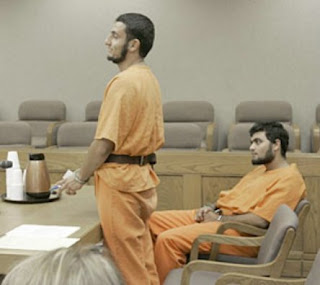Indian media have been publishing exposés documenting the foul behavior of Gulf Arabs in the southern Indian town of Hyderabad. "Fly-by-night bridegrooms" by R Akhileshwari in the Deccan Herald and "One minor girl, many Arabs" by Mohammed Wajihuddin in the Times of India are two important examples. Wajihuddin sets the stage:
They are old predators with new vigour. Often bearded, invariably in flowing robes and expensive turbans. The rich, middle-aged Arabs increasingly stalk the deprived streets of Hyderabad like medieval monarchs would stalk their harems in days that we wrongly think are history. These Viagra-enabled Arabs are perpetrating a blatant crime under the veneer of nikaah, the Islamic rules of marriage.
(I have silently corrected some typos). Wajihuddin then specifies the problem:
Misusing the sanctioned provision which allows a Muslim man to have four wives at a time, many old Arabs are not just marrying minors in Hyderabad, but marrying more than one minor in a single sitting. "The Arabs prefer teenage, virgin brides," says Jameela Nishat, who counsels and sensitises young women against the malaise.
The Arabs usually "marry" the girls for short periods, sometimes just a single night. In fact, Wajihuddin reports, marriage and divorce formalities are often prepared at the same time, thereby expediting the process for all involved. Akhileshwari notes that "their girl children are available for as little as 5,000 rupees to satisfy the lust of doddering old Arab men." Five thousand rupees, by the way, equals just a bit over US$100.
An Indian television program recently reported on a show-casing of eight prospective brides, most of them minors, at which they were offered up to their Arab suitors. "It resembled a brothel. The girls were paraded before the Arab who would lift the girls' burqa, run his fingers through their hair, gaze at their figures and converse through an interpreter," recalls one of Nishat's assistants.
Wajihuddin also offers a specific case history:
On the first of August, forty-five-year-old Al Rahman Ismail Mirza Abdul Jabbar, a sheikh from the UAE, approached a broker in these matters, seventy-year-old Zainab Bi, in the walled city, near the historic Char Minar. The broker procured Farheen Sultana and Hina Sultana, aged between thirteen and fifteen, for twenty thousand rupees [DP comment: that equals US$450]. Then he hired Qazi [DP comment: an Islamic judge, usually spelled qadi in English] Mohammed Abdul Waheed Qureshi to solemnise the marriage. The qazi, taking advantage of an Islamic provision, married the girls off to the Arab. After the wedding night with the girls, the Arab left at dawn.
So much for that "marriage."
Sunita Krishnan, head of an anti human-trafficking organization, Prajwala, makes the only too-obvious point that girl children are not valued. "If a girl child is sold or her life ruined, it is not a national loss, that's why this is a non-issue, both for community and to society." With the exception of Maulana Hameeduddin Aqil, the head of Millat-e-Islamia (a local organization, apparently not connected the notorious Pakistani terrorist group), who speaks out against these sham marriages ("They are committing a sin. It's not nikaah, it's prostitution by another name"), the Islamic authorities in India are almost all silent about this travesty of the Shari'a.
For their part, Muslim politicians in the city of Hyderabad apparently could care less. "It's not on the poll agenda of any politician," says Mazhar Hussain, director of a social welfare organization, the Confederation of Voluntary Associations. The Majlis-e-Ittihadul Muslameen, the main party of Hyderabad's Muslims, is blissfully unconcerned: "You cannot deny that the fortunes of many families have changed through such marriages," MIM's president, Sultan Salahuddin Owaisi, cheerfully points out.
Labels: Arab Sex Tourism violates young Indian girls, temporary marriage









